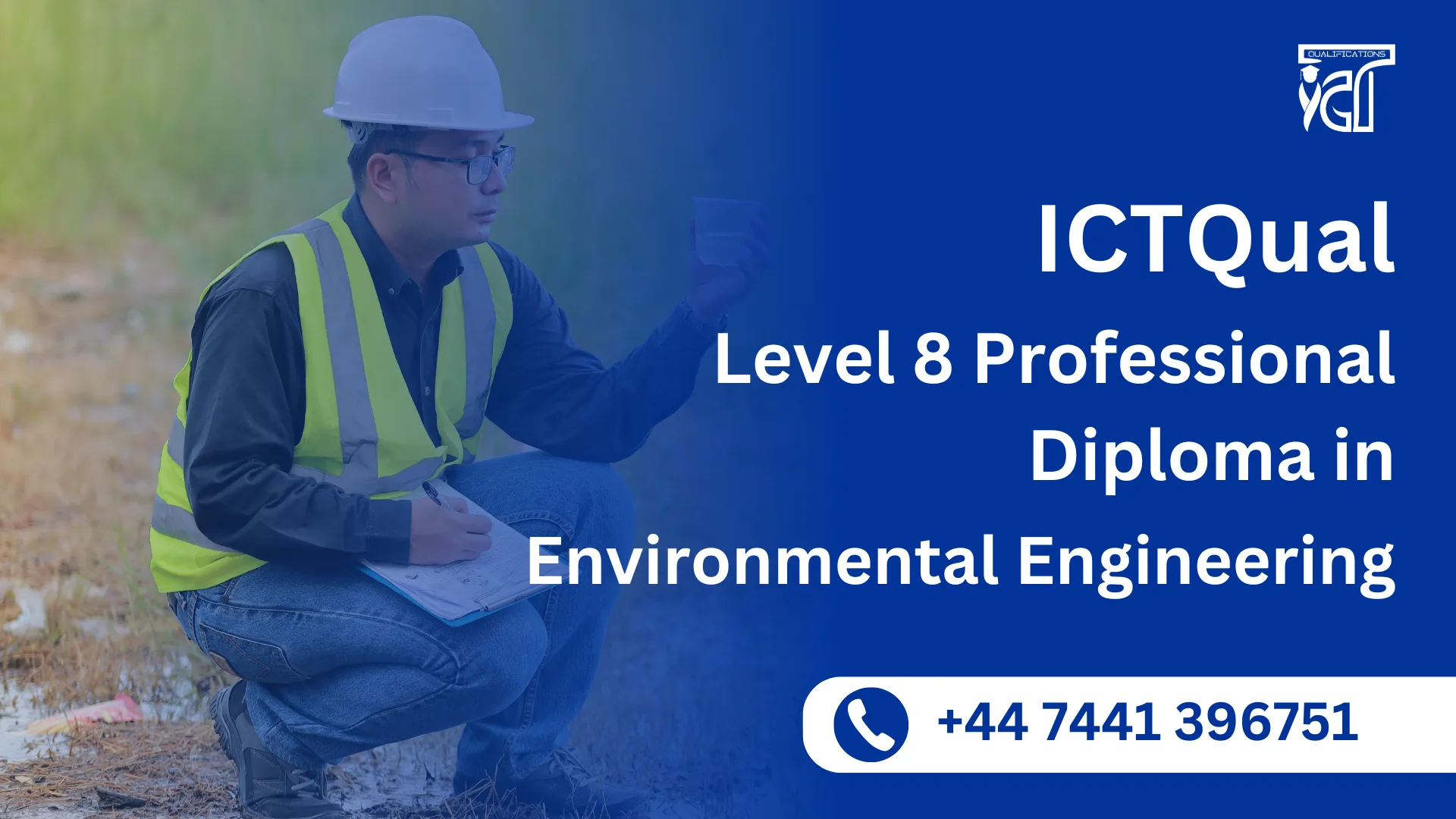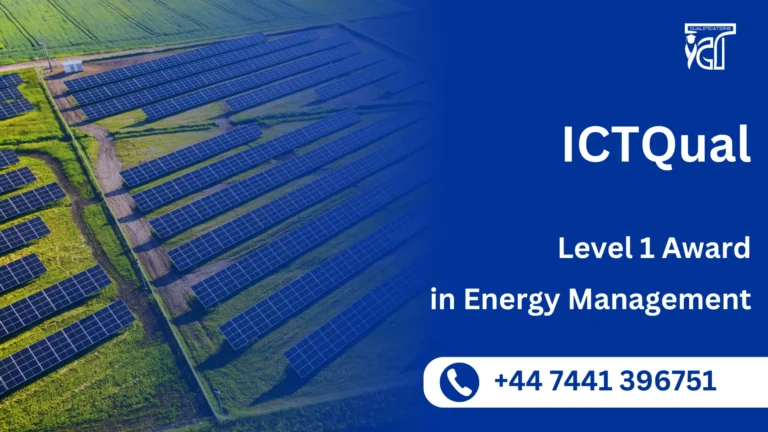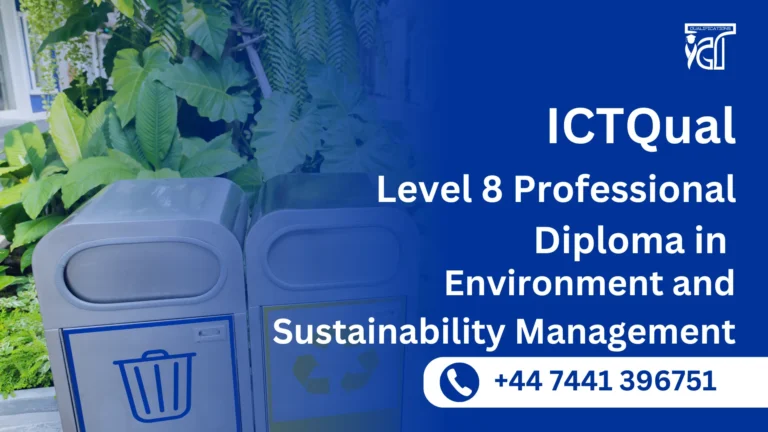In a world increasingly focused on addressing climate change and promoting sustainable development, environmental engineering plays a critical role in shaping the future. The ICTQual Level 8 Professional Diploma in Environmental Engineering provides advanced expertise for professionals who wish to lead in the design, management, and implementation of sustainable engineering solutions. This Ofqual-regulated, globally recognized qualification is designed for senior professionals aiming to tackle complex environmental challenges using cutting-edge engineering practices.
Whether you are seeking to enhance your expertise in environmental systems, or you are aiming for a leadership role in sustainability-focused engineering projects, this diploma equips you with the necessary tools to drive impactful change across industries.
The ICTQual Level 8 Professional Diploma in Environmental Engineering is a postgraduate-level qualification that focuses on providing advanced knowledge and practical skills to manage environmental engineering projects. It is designed for professionals who want to elevate their careers in environmental engineering, focusing on sustainable practices, regulatory compliance, and the development of innovative engineering solutions for environmental protection.
This diploma is Ofqual-regulated and provides learners with the credentials to work on high-level environmental engineering projects, ensuring they are equipped to make strategic decisions that benefit both businesses and the planet.
The ICTQual Level 8 Professional Diploma in Environmental Engineering is a highly specialized qualification aimed at professionals working or aspiring to work in environmental engineering and sustainability. The course provides comprehensive coverage of the technical, environmental, and regulatory aspects of environmental engineering, including areas such as water and wastewater management, waste management, energy efficiency, and environmental impact assessments.
The course is delivered via assignment-based assessments, offering flexibility for professionals to study at their own pace while applying the knowledge to real-world scenarios. This qualification is globally recognized, making it an ideal choice for professionals worldwide who want to enhance their qualifications in environmental engineering.
The ICTQual Level 8 Professional Diploma in Environmental Engineering is the perfect qualification for professionals looking to take their environmental engineering expertise to the next level. With its Ofqual regulation, global recognition, and assignment-based assessment format, it offers a comprehensive pathway to senior leadership positions in the sustainable engineering sector.
If you are passionate about making a meaningful impact on the environment and leading change through innovative engineering solutions, enrol today and equip yourself with the skills to drive the future of sustainable engineering.
ICTQual Level 8 Professional Diploma in Environmental Engineering
Following are the study units of ICTQual Level 8 Professional Diploma in Environmental Engineering”
- Advanced Environmental Impact Assessment
- Pollution Control Technologies
- Study Unit 3: Sustainable Development and Green Practices
- Waste Management and Remediation
- Capstone Research in Environmental Engineering
GLH (Guided Learning Hours) and TQT (Total Qualification Time) are terms commonly used in vocational qualifications to help define the amount of time a learner is expected to spend on their studies.
1. GLH (Guided Learning Hours)
GLH refers to the number of hours a learner spends being directly taught, supervised, or supported during their course. This includes the time spent in activities such as:
- Classroom instruction
- Practical workshops
- One-on-one tutoring or mentoring sessions
- Online learning sessions with tutor support
In other words, GLH represents the time that learners are actively engaged with their instructors or learning activities.
2. TQT (Total Qualification Time)
TQT represents the total amount of time a learner is expected to invest in completing a qualification, including:
- GLH (Guided Learning Hours): Time spent on direct learning, as explained above.
- Self-Directed Learning: This includes time spent on independent study, research, assignment completion, preparation for exams, and any other work the learner does outside of direct teaching hours.
TQT is a broader measure that includes all the time required to achieve the qualification. It helps learners and employers understand the overall commitment required for the qualification.
Key Differences Between GLH and TQT:
- GLH focuses on direct learning with guidance or supervision.
- TQT includes GLH as well as independent study time and other learning-related activities.
Example:
If a qualification has a TQT of 600 hours and a GLH of 250 hours, it means the learner should spend 250 hours in direct learning (classroom, online, or tutor-led sessions) and 350 hours on independent study or research.
Study Unit 1: Advanced Environmental Impact Assessment (36 Credit Hours)
- Comprehensive Understanding: Gain a thorough understanding of environmental impact assessment (EIA) methodologies and frameworks, including their evolution and applications in diverse contexts.
- Advanced Techniques Mastery: Develop proficiency in advanced techniques for predicting, evaluating, and mitigating environmental impacts associated with development projects across various sectors.
- Case Study Analysis: Analyze complex environmental impact assessment case studies from infrastructure, energy, transportation, and other sectors to identify key challenges and best practices.
- Application Skills: Apply advanced modeling tools and software for environmental impact analysis, demonstrating the ability to interpret and communicate assessment results effectively.
Study Unit 2: Pollution Control Technologies (36 Credit Hours)
- Technological Expertise: Explore advanced pollution control technologies for air, water, and soil remediation in-depth, understanding their principles, applications, and limitations.
- Emerging Technologies Evaluation: Evaluate emerging technologies for their effectiveness in addressing environmental pollution, considering factors such as efficiency, scalability, and environmental impact.
- Design and Implementation: Develop the skills to design and implement pollution prevention and control strategies in industrial and urban settings, considering factors such as regulatory compliance and cost-effectiveness.
- Case Study Examination: Analyze case studies of successful pollution control projects to understand the practical application of technologies and their environmental impact assessments.
Study Unit 3: Sustainable Development and Green Practices (36 Credit Hours)
- Sustainability Principles: Examine principles and practices of sustainable development within the context of environmental engineering, understanding the interplay between environmental, social, and economic factors.
- Technological Analysis: Analyze green technologies and sustainable solutions for energy, water, and waste management, assessing their environmental benefits and potential challenges.
- Integration Skills: Integrate sustainability principles into engineering design and decision-making processes, considering factors such as life cycle assessment, carbon footprint, and ecosystem services.
- Policy Evaluation: Evaluate sustainable development policies and their implementation at local, national, and global levels, identifying opportunities for improvement and innovation.
Study Unit 4: Waste Management and Remediation (36 Credit Hours)
- Waste Management Expertise: Acquire advanced knowledge of waste management principles, including waste minimization, recycling, and disposal techniques, and their environmental implications.
- Remediation Strategies: Explore remediation strategies for contaminated sites, including soil and groundwater remediation technologies, understanding their mechanisms and effectiveness.
- Regulatory Assessment: Assess regulatory frameworks and best practices in waste management and site remediation, ensuring compliance with environmental regulations and standards.
- Practical Application: Apply theoretical knowledge through case studies and hands-on exercises in waste management and remediation projects, demonstrating problem-solving and decision-making skills.
Research Project: Capstone Research in Environmental Engineering (36 Credit Hours)
- Independent Research: Conduct independent research on a contemporary issue or challenge in environmental engineering, demonstrating originality, creativity, and critical thinking.
- Research Design: Formulate clear research hypotheses, design robust methodologies, and conduct comprehensive literature reviews to contextualize the research within existing knowledge.
- Data Collection and Analysis: Collect, analyze, and interpret data using advanced methodologies and tools, ensuring accuracy, reliability, and validity of research findings.
- Communication Skills: Present research findings, conclusions, and recommendations effectively in a comprehensive report, demonstrating clarity, coherence, and professionalism.
- Knowledge Contribution: Make a significant contribution to the advancement of knowledge in environmental engineering through original research, addressing gaps, and proposing innovative solutions.
Benefits of the ICTQual Level 8 Professional Diploma in Environmental Engineering
- Globally Recognized: The course is Ofqual-regulated and widely accepted by employers and institutions around the world.
- Flexible Learning: 100% assignment-based, allowing you to complete the course at your own pace while balancing work commitments.
- Advanced Expertise: Equip yourself with postgraduate-level knowledge in environmental engineering and sustainability practices.
- Career Advancement: Open doors to leadership roles in environmental engineering, sustainability consultancy, and project management.
- Practical Skills: Learn how to design and implement sustainable engineering solutions that address real-world environmental challenges.
- Impactful Contribution: Gain the skills to lead projects that make a positive impact on the environment, from waste management to renewable energy solutions.
- Enhanced Employability: Boost your professional credentials with a prestigious qualification recognized across industries.
- Global Opportunities: The qualification allows for international mobility, providing career prospects in sustainability and engineering projects worldwide.
- Comprehensive Learning: Develop expertise in energy efficiency, water management, and environmental impact assessments, all essential areas of environmental engineering.
The ICTQual Level 8 Professional Diploma in Environmental Engineering is the ideal qualification for professionals who wish to advance their careers in the rapidly growing field of environmental engineering. This course is best suited for:
- Experienced Engineers looking to enhance their expertise in sustainable practices and environmental management.
- Senior Managers or Leaders in engineering or sustainability-focused roles who aim to take on higher responsibilities in environmental project leadership.
- Environmental Consultants seeking advanced qualifications to stay competitive in the field of sustainability and environmental engineering.
- Government Policy Makers working on large-scale environmental and infrastructure projects, needing deeper knowledge of sustainable engineering solutions.
- Project Managers in industries such as construction, energy, or waste management, wanting to specialize in green building or sustainable infrastructure projects.
- Academics and Researchers pursuing further qualifications or research in environmental engineering or sustainability.
This course equips individuals with the advanced knowledge and skills required to lead in high-level environmental engineering projects and make meaningful contributions to sustainability efforts globally.
Entry Requirements
Register Now
Qualification Process
Qualification Process for the ICTQual Level 8 Professional Diploma in Environmental Engineering
- Self-Assessment:
Begin by evaluating your eligibility to ensure you meet the qualification requirements, including work experience, knowledge, and language proficiency. - Registration:
Complete your registration by submitting the required documents, including a scanned copy of a valid ID, and paying the registration fee. - Induction:
An assessor will conduct an induction to confirm your eligibility for the course and explain the evidence requirements. If you do not meet the criteria, your registration will be canceled, and the fee will be refunded. - Assignmnets & Evidence Submission:
Provide all assignmnets and the necessary evidence based on the assessment criteria outlined in the course. If you are unsure of the required evidence, consult with the assessor for guidance on the type and nature of evidence needed. - Feedback and Revision:
The assessor will review your submitted evidence and provide feedback. Evidence that meets the criteria will be marked as “Criteria Met,” while any gaps will be identified. You will be asked to revise and resubmit if needed. - Competence Evidence:
Submit final evidence demonstrating that all learning outcomes have been met. This evidence will be marked as “Criteria Met” by the assessor once it is satisfactory. - Internal Quality Assurance (IQA):
The Internal Quality Assurance Verifier (IQA) will review your evidence to ensure consistency, quality, and compliance with standards. - External Verification:
The IQA will submit your portfolio to ICTQUAL AB External Quality Assurance Verifiers (EQA) for final confirmation. The EQA may contact you directly to verify the authenticity of your evidence. - Certification:
Upon successful completion of all checks, ICTQUAL AB will issue your official certificate, confirming that you have attained the ICTQual Level 8 Professional Diploma in Environmental Engineering.







